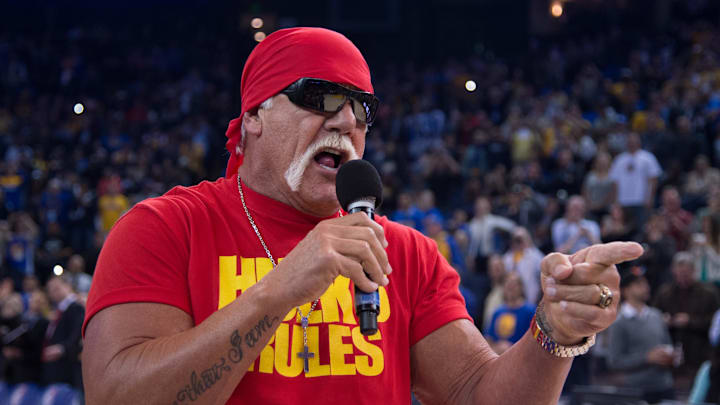Few issues in wrestling flog the expired equine like the death of WCW. Sitting through the four-part VICE series, nothing changed. Greed, ignorance, and horrendous behavior by management led to the demise of the last American wrestling company to ever threaten the WWF/E. When the WWE purchased WCW, it did the wrestling world a favor. Many view it as murder. In all honesty, euthanasia feels more appropriate. John Kennedy once said, "Victory has many fathers, but defeat is an orphan." In WCW, common sense served as the orphan, and otherworldly buffoonery boasted many fathers.
Eric Bischoff
As an on-screen character, Bischoff excelled. Exuding a palpable smarminess, Bischoff fit the role. A perfect heel authority figure. However, when he ventured backstage to call the shots and sign checks, the wheels fell off. Granted, WCW beat WWF for eighty-three weeks. However, rating wars are marathons, never sprints.
In the big picture, that year-and-a-half constitutes nothing more than an eyeblink in wrestling history. In his defense, Bischoff built an entire brand off an idea that was not his. Completely borrowing the idea from New Japan's Battle Formation show, the NWO idea, initially worked. By watching Hulk Hogan turn heel, wrestling stood still. Unfortunately, much like tequila or brownies, too much of something makes you sick. Bischoff saturated the airwaves with NWO storylines and splinter groups. In all honesty, the faces usually close out big angles with victories. The NWO clowned WCW during the four-year program. Additionally, watching the VICE documentary, Bischoff refuses to accept much blame or lay responsibility.
Hulk Hogan
In what world should a wrestler's contract grant him creative control? In allowing this, WCW sat at Hogan's mercy. If he didn't want to do anything, like, actually lose a match, he wouldn't. Imagine Harley Race or in modern thought, Roman Reigns possessing the ability to just not do the honors and emerge from every storyline looking better and better. By 1996, Hogan's popularity, much like his hairline, vanished. As a result, the NWO reinvigorated his career. At the same time, Hogan ran WCW, as de facto leader. Bischoff didn't appear to ever stand up to him. In fact, he looked in lockstep. From 1984-1992, Hulk Hogan helped to usher Wrestling into the mainstream. From 1996-2000, he helped WCW hop in the pine box on its way to ending. Ego and the lack of anyone telling him no.
Turner
Turner executives fell for Bischoff's thought pattern. Somehow, Antonio Inoki, through Bischoff persuaded WCW to televise a pay-per-view in North Korea in 1995. Yes, the number two wrestling organization hosted a show in front of a captive audience. This travesty granted the North Korean government and its leader free publicity and a renovated image. However, the issues started long before. The day Turner bought out Jim Crockett, the company changed.
Turner also decided that Jim Herd fit the role. Herd's claim wrestling fame before that? Managing a St. Louis television station that produced wrestling. Herd, the same man who thought that sneaker company Roos and WCW fit together as business partner. No one wore those hideous sneakers with pockets. In hiring Bischoff to run the company, based on just an unoriginal idea, WCW failed to create a long-term plan. Turner compounded these errors by hiring.
Vince Russo
Crash TV's founding father believed that he could fix WCW. Russo believed in edgy programming, just to be edgy, without substance, just to catch attention. If you look back, the reason why wrestling, in spots, lacks coherent storylines is because Vince Russo's microwave-attention-span booking became popular. From the Misfits in Action (GI Bro, anyone?) to making light of Jim Ross' Bell's Palsy, no bottom existed for him. Plus, making himself and David Arquette the WCW World Heavyweight Champion tarnished the legacy of a title that Flair and Sting wore with distinction.
In the ensuing years, other companies gave Russo a chance to shorten their existence with his booking. TNA exists, despite Bischoff, Hogan, and Russo. The man behind Beaver Cleavage didn't possess a quality idea. Literally, the Rasputin of wrestling companies. Russo's justifications during this series serve only himself, elucidating nothing new. Just talking, Bro.
Proper Goodbye
World Championship Wrestling boasted some of the best veteran talent mixed with upcoming young athletes. The company broke ground, openly challenging the WWF/E by airing Nitro opposite Monday Night Raw. Years before, they struggled with overly gimmicked matches and insipid storylines. On July 7, 1996, almost twenty-eight years ago, Hulk Hogan and WCW changed the landscape. Unfortunately, that change saw the overuse of one angle that never evolves. Talented performers like Mike Awesome donned polyester suits to attempt to gain attention. Despite wrestling an impact-oriented, athletic style, WCW squandered his skillset. Furthermore, the company's weird fixation with beefing with Stamford only hurt them. In fact, when Mankind won his first WWF/E Championship, Tony Schiavone informed viewers. In that instant, the Monday Night War officially ended. Concomitantly, figuring out who needs the blame for WCW's ultimate failure resides with those in power: everyone.
